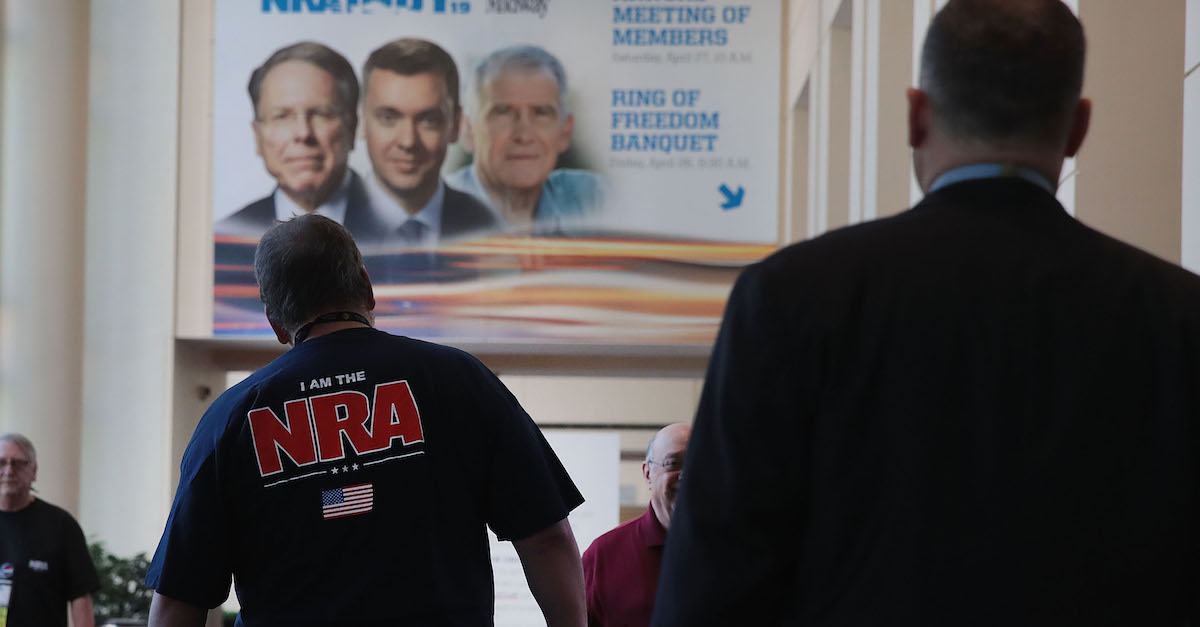
Nearly a month after the National Rifle Association’s trial kicked off in Texas, those proceedings have been drawing to a close on Monday with an attorney for the New York attorney general’s office claiming that the filing of the bankruptcy petition involved a fraud upon the court.
“This is as shocking as it is completely dishonest,” attorney Gerrit Pronske, an attorney for the New York Attorney General’s Office, declared on Monday. “It is nothing less than fraud and recklessly, it put the NRA in a horrible position.”
The NRA filed a federal bankruptcy petition in Texas earlier this year to avoid a lawsuit that New York Attorney General Letitia James (D) filed to shut down the organization for allegedly using the company as a “piggy bank” in violation of charity law. The NRA boasted earlier this year of being “in its strongest financial condition in years,” and it justified the maneuver on the grounds that it was “dumping New York” and “utilizing the protection of the bankruptcy court” in order to organize its “legal and regulatory matters in efficient forum.”
Since the group was founded some 150 years ago in New York, NRA executive vice president and CEO Wayne LaPierre sought a more favorable forum in the Lone Star State by forming a company Sea Girt LLC, which regulators call a “wholly owned shell company” designed to manufacture jurisdiction in Texas.
“Its formation, your honor, is pure forum shopping,” Pronske said, referring to the limited liability company. “Sea Girt is the poster child of a bankruptcy filed in bad faith.”
Where Pronske alleges the NRA’s petition turned fraudulent is in suggesting that the group’s board agreed to declare bankruptcy.
NRA board member Phil Journey, a Wichita judge who has called for an examiner to oversee the group, called the manner the group obtained approval as a “fraud perpetrated on the court.”
“I agree with this board member’s statement,” Pronske said.
“There is no question that the NRA board was tricked into attempting to delegate authority to file bankruptcy, and that’s not just fraud on the board,” Pronske added. “That’s a fraud on this court.”
A host of former and current top NRA executives testified over the course of the nearly monthlong trial. The group’s former chief financial officer Craig Spray and general counsel John Frazier both expressed surprise at the bankruptcy filing. But the most high-profile testimony came from LaPierre himself, who testified several days as a witness for the New York Attorney General and separately, for the NRA.
Though LaPierre may have believed the bankruptcy would shield the NRA, the trial has led to a string of embarrassing headlines for the gun group.
On April 7, LaPierre testified about his lavish lifestyle on the dime of the NRA, its donors and its friends, including flying exclusively by private charter jet, which the New York Attorney General contends arose from conflicts of interest.
During his first six-hour stretch of testimony, LaPierre defended receiving nearly $300,000 in Italian suits from a Beverly Hills Zegna, which the group’s longtime public relations Ackerman McQueen bought him for television appearances. LaPierre also claimed that he went on Hollywood producer Stanton McKenzie’s 108-foot yacht, the Illusions, after the Sandy Hook shooting for “security” reasons. The NRA chief wound up taking eight trips to the Bahamas on that yacht.
“These weeklong private trips on yachts are straight out of the ‘Lifestyles of the Rich and Famous,’ and come complete with fuel, food on the yacht, a chef and complete crews,” Pronske said. “In addition to the yacht trips, was a lavish vacation in to Atlantis in the Bahamas, all paid for by Mr. McKenzie.”
The NRA’s lawyer Greg Garman acknowledged that the trial would not be without “cringeworthy” revelations, including the fact that the group’s former chief financial officer Wilson Phillips repeatedly invoked his Fifth Amendment right against self-incrimination when the attorney general’s office deposed him.
Speaking of those revelations, Garman insisted: “It is cold. It is stale. It has been cured.”
The attorney general’s office denies that claim, and Assistant U.S. Attorney Lisa Lambert formally announced her position opposing the NRA’s bankruptcy petition during closing arguments, blasting LaPierre for “failing to provide” oversight to the organization.
Without explicitly casting aspersions on President Joe Biden’s Department of Justice, Garman mentioned the Trustee’s position in relationship to the NRA’s opposition: “We have natural enemies,” Garman remarked, cryptically.
Ackerman McQueen lawyer Brian Mason said that the NRA’s premise that it cannot get a fair shake in New York “slandered and libeled” the Empire State.
“It’s all a bunch of political, public relations noise,” Mason added.
As Mason noted, the New York attorney general’s request to shut down the NRA would need to be enforced by a judge and upheld by two levels of appellate courts.
At the end of daylong arguments, U.S. Bankruptcy Judge Harlin Hale signaled that he hoped to issue a written ruling by early next week. Hale commented that the NRA case has been one of the most significant of his career on the bench, falling in the twilight of his tenure. He said he had planned to retire next year.
Listen to highlights of LaPierre’s testimony and more on the NRA trial on Law&Crime’s podcast, “Objections”:
Update—May 3 at 3:19 p.m. Central Time: This story has been updated to include an excerpt from the NRA’s summation.
Update—May 3 at 5:19 p.m. Central Time: This story has been updated shortly after the conclusion of summations.
(Photo by Scott Olson/Getty Images)